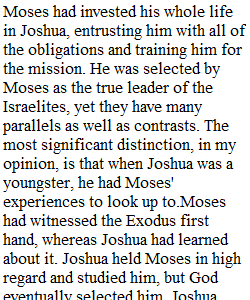


Q Please respond to at least two of the following. In addition, respond to two of your peers as well. You have now been exposed to two major leaders within the Bible. In what ways are Moses and Joshua different? Feel free to pick one way they are different and to elaborate on that way. Explain Judges’ cyclical view of Israel’s premonarchic history. What function does the role of “judges”—military deliverers—play in this cycle? Explain the significance of women in the Judges narrative, including the tales of Deborah, Jael, and Delilah, as well as unnamed women, such as the defender of her city who crushed Abimelech’s skull, Samson’s mother, and the Levite concubine who was raped, killed, and dismembered. What examples of different kinds of political military leadership do such diverse figures as Deborah, Gideon, Abimelech, and Jephthah represent for Israel? Comment on the these different leadership styles. What conclusions does the Deuteronomistic author of Judges apparently draw from the repeated failures of Israel’s tribal leaders to ensure either Israel’s self-preservation or its fulfillment of covenant obligations? Is Israel unequal to the task of nation building and divine service, no matter who leads it? Draw conclusions about the laws pertaining to women. Identify several reasons why the book of Joshua is important—for the characters in the narrative, the country of Israel, and any other group you can think of. (What does the book add to our understanding of God’s chosen people?) Analyze the myriad ways the Israelites deal with foreigners? Then, make a claim about them and back that claim up. How do your readings add or detract from your understanding of God's character thus far? Dealer's Choice: Anything I didn't think to ask regarding your readings is fair game: just be sure to have a claim/assertion to backup.
View Related Questions